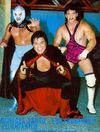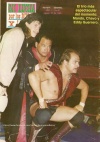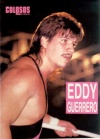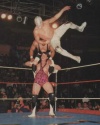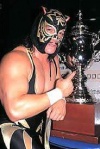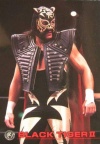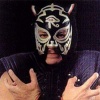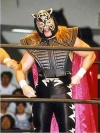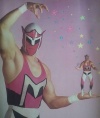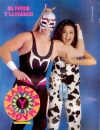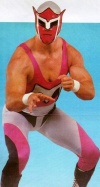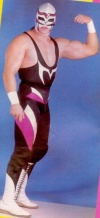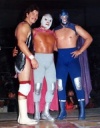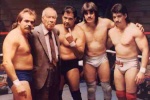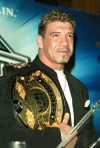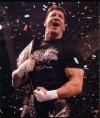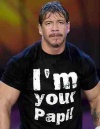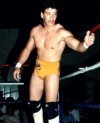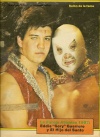Eddy Guerrero: Difference between revisions
| (One intermediate revision by one other user not shown) | |||
| Line 28: | Line 28: | ||
=== Debut and Early Career === | === Debut and Early Career === | ||
Eddie was trained by his father Gory, and his cousin [[Javier Llanes]]. Several sources say his debut was on 1987 at Auditorio Municipal de Ciudad Juarez, Chihuahua in a tag team match with [[El Matemático]] aganist [[Flama Roja]] and [[El Vikingo]]. However, his in ring career should be since at least 1986. Javier Llanes stated that Eddie debuted at Arena Internacional, in Colonia Chaveña in Ciudad Juárez where all Guerreros and Llanes debuted. According to Revista KO # | Eddie was trained by his father Gory, and his cousin [[Javier Llanes]]. Several sources say his debut was on 1987 at Auditorio Municipal de Ciudad Juarez, Chihuahua in a tag team match with [[El Matemático]] aganist [[Flama Roja]] and [[El Vikingo]]. However, his in ring career should be since at least 1986. Javier Llanes stated that Eddie debuted at Arena Internacional, in Colonia Chaveña in Ciudad Juárez where all Guerreros and Llanes debuted. According to Revista KO #1718 published on June 29, 1986, it states his debut was in June 15, 1986 in El Paso Civic Center. His debut in [[Arena Mexico]] was on [[September 5]], [[1986]]<ref>[https://www.luchadb.com/events/shows/00051000/00051146.php luchadb.com Eddie Guerrero Profile Card]</ref><ref>[https://www.cagematch.net/?id=1&nr=33823 Cagematch.net]</ref><ref>[https://www.facebook.com/96186896558/posts/10156986969931559/ Revista Box y Lucha]</ref>. He went in a tag team match with [[Mogur]] against [[Ari Romero]] and [[Guerrero Negro]]. In early days he went as Gory Guerrero Jr. | ||
His first rivalry was against [[Ari Romero]], they went in a lucha de apuestas that ended in Guerrero's first victory. During late 1980s and early 1990s, Guerrero had hair wins against [[Negro Casas]], [[Lobo Rubio]], [[La Fiera]], and [[Babe Face]]. | His first rivalry was against [[Ari Romero]], they went in a lucha de apuestas that ended in Guerrero's first victory. During late 1980s and early 1990s, Guerrero had hair wins against [[Negro Casas]], [[Lobo Rubio]], [[La Fiera]], and [[Babe Face]]. | ||
| Line 121: | Line 121: | ||
<br clear=all> | <br clear=all> | ||
{{Gallery|name=Eddie Guerrero TJ.jpg|caption=}} | {{Gallery|name=Eddie Guerrero TJ.jpg|caption=}} | ||
{{Gallery|name=12496196_748409725289884_191515368146528625_o.jpg|caption=}} | |||
[[Category:Mexican wrestlers]] | [[Category:Mexican wrestlers]] | ||
[[Category:Ciudad Juarez based wrestlers]] | [[Category:Ciudad Juarez based wrestlers]] | ||
Latest revision as of 18:31, 7 November 2020
Profile
| Eddy Guerrero | |||||||||||||||||||||||||||||
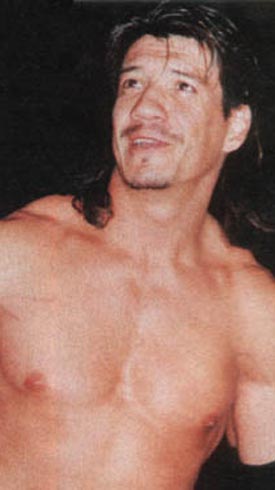 |
|
||||||||||||||||||||||||||||
| Wrestling Observer Hall Of Fame Member |
|---|
Biography
Eduardo Gory Guerrero Llanes better known in the world of wrestling as Eddie Guerrero is regarded as one of the greatest in-ring performers of all time. He is member of the Guerrero-Llanes Dynasty being the youngest son of Gory Guerrero.
Early Life
Eddie Guerrero was born on October 9, 1967 in El Paso, Texas, even tough some sources say he was born in Ciudad Juarez where he began his early days as a professional wrestler. Before folling in the footsteps of his father and older brothers Chavo, Mando, and Hector, Eddie practiced collegiate wrestling.
Debut and Early Career
Eddie was trained by his father Gory, and his cousin Javier Llanes. Several sources say his debut was on 1987 at Auditorio Municipal de Ciudad Juarez, Chihuahua in a tag team match with El Matemático aganist Flama Roja and El Vikingo. However, his in ring career should be since at least 1986. Javier Llanes stated that Eddie debuted at Arena Internacional, in Colonia Chaveña in Ciudad Juárez where all Guerreros and Llanes debuted. According to Revista KO #1718 published on June 29, 1986, it states his debut was in June 15, 1986 in El Paso Civic Center. His debut in Arena Mexico was on September 5, 1986[4][5][6]. He went in a tag team match with Mogur against Ari Romero and Guerrero Negro. In early days he went as Gory Guerrero Jr.
His first rivalry was against Ari Romero, they went in a lucha de apuestas that ended in Guerrero's first victory. During late 1980s and early 1990s, Guerrero had hair wins against Negro Casas, Lobo Rubio, La Fiera, and Babe Face.
Benjamin Mora saw him and he decided promoting Guerrero in his magazine Lucha Libre.
La Nueva Pareja Atómica
In 1987 with Hijo del Santo comprised the short-lived Nueva Pareja Atómica as their fathers did. Box y Lucha proclaimed the new Pareja Atómica were Perro Aguayo and Villano III, however Lucha Libre promoted the heirs of the original Pareja Atómica, the lucha libre legends Santo & Gory Guerrero.
The First Máscara Mágica
The Guerrero brothers made tours in Mexico occasionally, during those days they could be seen in Arena Mexico. Chavo, Mando, and Eddie were seen in all the country when the television came in. The Guerreros kept appearing until EMLL for some reason decided to mask them along with several others. Hector Guerrero was repackaged as Lassertron, Mando was El Psicopata, and Eddie became Máscara Mágica on July 21, 1992. He was introduced by the lucha libre magazines as a Mexican-American wrestler with a background sports in Olympic wrestling. Eddie felt uncomfortable with the gimmick and in November of that year, he signed in with AAA unmasking voluntarily in his debut[7]
AAA
In AAA the Nueva pareja Atómica reunited becoming a great draw by 1993. This tag team did not last for long, they split when Guerrero made his rudo turn and joined Love Machine to become the fearsome La Pareja del Terror also known as Los Gringos Locos. By 1994, AAA allied with IWC, and they presented the PPV "When Worlds Collied", transmitted in Mexico and the United States with a production of Ted Turner and WCW. That event reached its climax with the feud between Los Gringos Locos against Hijo del Santo and Octagon. In that lucha de apuestas Guerrero and Love Machine lost their hairs, this rivalry was not only the end of a rivalry, but also the end of an era.
Black Tiger II
1993 was also a year of opportunities for him in Japan. He was hired in New Japan Pro Wrestling, but he had to wear a mask once again. On August 8, 1993 at the Ryogoku Sumo Hall in Tokyo, Japan Jushin Liger retained the IWGP Jr. Championship against Wild Pegasus. Suddenly, Black Tiger appeared, but not the same who was the nemesis of Tiger Mask and Liger in the last, now was Eddie Guerrero. The new Black Tiger and Pegasus beat Liger severely until El Samurai went to his aid. Black Tiger is intended to be the nemesis of Tiger Mask, but Tiger Mask III was injured and Liger became the biggest rival of Black Tiger II. Liger was defeated by Black Tiger many times but the big matches were won by Liger until in June 3, 1996 Black Tiger II defeated Liger in the finals of Best of the Super Juniors 3 in Osaka. He went as Black Tiger until 1998.
ECW
The promoter of ECW, Paul Heyman was interested in Eddie and Art Barr, they were among the AAA luchadors that would come to ECW thru Konnan. Unfortunately, on November 23, 1996, Barr passed away. With the presence of Mexican luchadores, ECW had memorable matches, Eddie Guerrero and Dean Malenko, gave series of amazing matches. ECW was characterized for its ultra violent matches with lack of technique, but when Heyman saw the crowd's response to the Mexican style, he kept going with it.
WCW and the LWO
Eric Bishoff wanted to make WCW more and hired Guerrero, along with Malenko, and Chris Benoit, moreover, Konnan and a group of Mexican luchadores. Guerrero had great victories, in 1996 he won a tournament and won the WCW United States Championship. Then with the recently created cruiserweight division, Eddie competed and became champion on September 14, 1997. He lost the title and recovered against Rey Misterio Jr.. Finally, he lost it on December of 1997 against Ultimo Dragon. He had a feud with his nephew Chavo Guerrero Jr. that ended in a hair vs hair match.
On the Monday Night Nitro of October 5, 1998, Guerrero inrrupted a match between Damian 666 and Héctor Garza telling them that as fellow Latinos they should not fight between them. He offered them to join the LWO (Latino World Order). La Parka, Psicosis, Villano IV, Villano V, Silver King and El Dandy joined. Unfortunately, Eddie suffered a car accident and without a leader and a voice (Eddie was the only English speaker) for these reasons, this lucha libre group had to disband. In 1999, Guerrero went back to the ring, but more aggressive with the former members.[8]
Latino Heat
On January 31, 2000, Guerrero, Benoit, Malenko, and Saturn appeared in WWE as The Radicalz. From then he went under the "Latino Heat" gimmick. He won the WWE European title and he was Intercontinental champion twice. His biggest feature was on February 15, 2004 in the PPV "No Way Out" where he defeated Brock Lesnar to win the WWE Heavyweight Championship. On 2004 Guerrero had a polemical storyline with Rey Mysterio. On November 12, 2005 in Minneapolis, Minnesota after a dinner with Nicho and Chavo Guerrero Jr. in the Hotel Marriot, Eddie went to sleep telling it would be four years since he left his addictions. On the following day, his nephew Chavo and the hotel staff found him unconscious and he was pronounced dead when the paramedics arrived. He was 38 years old, nevertheless, he accomplished one of the most impressive pro-wrestling careers ever seen. He was a main eventer all around the World, won championship and earned recognition and respect.
Filmography
- Octagon y Atlantis: La Revancha (1992) - Assassin
Luchas de apuestas record
- ↑ Box y Lucha 2741
- ↑ Luchas 2000 293
- ↑ Revista KO 1718
- ↑ luchadb.com Eddie Guerrero Profile Card
- ↑ Cagematch.net
- ↑ Revista Box y Lucha
- ↑ AAA Sin Limite
- ↑ Super Luchas, Year 3, #137, November 21, 2005
Gallery
 Eddy Guerrero, second LAWA Champion in Juarez |
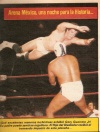 a young Eddy billed as Gory Jr. planchas onto El Hijo del Gladiador |
 With Art Barr |
 With Art Barr |
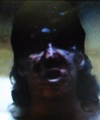 After match vs Ari Romero |
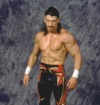 In WCW |
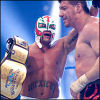 winning the tag title with Rey Mysterio |
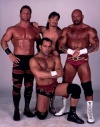 with Pegasus Kid, Dean Malenko and Perry Saturn |
